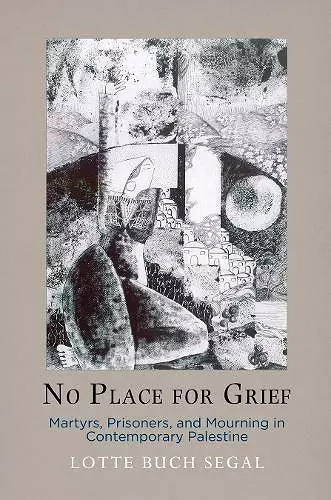No Place for Grief
Martyrs, Prisoners, and Mourning in Contemporary Palestine
Format:Paperback
Publisher:University of Pennsylvania Press
Published:13th May '25
Should be back in stock very soon

Advances an understanding of loss, mourning, and grief in contemporary Palestine
Westerners 'know' Palestine through images of war and people in immediate distress. Yet this focus has as its consequence that other, less spectacular stories of daily distress are rarely told. Those seldom noticed are the women behind the men who engage in armed resistance against the military occupation: wives of the Palestinian prisoners in Israeli detention and the widows of the martyrs. In Palestine, being related to a detainee serving a sentence for participation in the resistance activities against Israel is a source of pride. Consequently, the wives of detainees are expected to sustain these relationships through steadfast endurance, no matter the effects upon the marriage or family. Often people, media, and academic studies address the dramatic violence and direct affliction of the Palestinians. Lotte Buch Segal takes a different approach, and offers a glimpse of the lives, and the contradictory emotions, of the families of both detainees and martyrs through an in-depth ethnographic investigation.
No Place for Grief asks us to think about what it means to grieve when that which is grieved does not lend itself to a language of loss and mourning. What does it mean to "endure" when ordinary life is engulfed by the emotional labor required to withstand the pressures placed on Palestinian families by sustained imprisonment and bereavement? Despite an elaborate repertoire of narrative styles, laments, poetry, and performance of bodily gestures through which mourning can be articulated, including the mourning tied to a political cause, Buch Segal contends that these forms of expression are inadequate to the sorrow endured by detainees' wives. No Place for Grief reveals a new language that describes the entanglement of absence and intimacy, endurance and everyday life, and advances an understanding of loss, mourning, and grief in contemporary Palestine.
"Dealing with a most sensitive, politically charged, and grave reality, Buch Segal delivers a delicate and nuanced ethnographic account that is as committed to sophisticated anthropological inquiry as it is sensitive to the hopes and needs of the women whose stories her book tells...[A]n essential contribution to medical anthropology's longstanding effort to make suffering narratives comprehensible. [Buch Segal's] careful analysis of the political, social, linguistic, and psychological mechanisms that disallow the recognition of these women's suffering makes their stories intelligible, ethnographically and theoretically." (Medical Anthropology Quarterly) "[A] highly sophisticated ethnographic analysis,....With rare sensitivity, Buch Segal probes the painful experience of Palestinian women that is largely elided by both universalized psychiatric discourses and anticolonial nationalism." (Journal of Anthropological Research) "
[No Place for Grief] invites us to think about other understudied Palestinian families who share
similar experiences of continuous suffering due to forced separation...[A] unique, informative, and highly readable ethnography.
ISBN: 9781512827934
Dimensions: unknown
Weight: unknown
224 pages